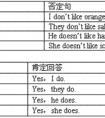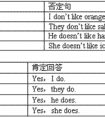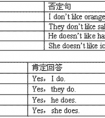选词填空。Would How WhatWhereWill 1.areyougoing?2.doyoufeel?3.isthematter?4. youliketoperformattheparty?5. youpromisetowritetome?-六年级英语
注意
be going to和will在含义和用法上稍有不同。be going to往往表示事先经过考虑的打算;will多表示意愿,决心。两者有时不能互换。如:
She is studying hard and is going to try for the exams.她正努力学习并尝试参加考试。(is going to不能用will替换)
(1)一般将来时表示将要发生的动作或情况。
例如:I will(shall) arrive tomorrow.我明天到。(主语是第一人称时最好用shall)
Will you be free tonight? 你今晚有空吗?
We won’t (shan’t) be busy this evening. 我们今晚不忙。
(2)在一般将来时的句子中,有时有表示将来时间的状语,有时没有时间状语,这时要从意思上判断是否指未来的动作或情况。例如:
Will she come? 她(会)来吗?
(3)在以第一人称I或we作主语的问句中,一般使用助动词shall,这时或是征求对方的意见,或是询问一个情况(b):
a. Where shall we meet? 我们在哪儿碰头?
b. Shall we have any classes tomorrow?明天我们有课吗?
在这类问句中,近几年来也有不少人用will,特别是在美国。例如:
How will I get there? 我怎么去?
(4)be going to+ 动词原形
a.表示计划、打算、准备做的事。例如:
We are going to put up a building here.我们打算在这里盖一座楼。
How are you going to spend your holidays?假期你准备怎样过?
b.表示即将发生或肯定要发生的事。例如:
I think it is going to snow. 我看要下雪了。
1)tomorrow,the day after tomorrow,tomorrow morning/afternoon/evening
2)next year/week/month/hour/day/century
3)in+一段时间
4)in the future
5)this afternoon/Sunday/evening
6)from now on
7)one day,someday (未来的)某天
8)soon
考点名称:固定搭配
- 固定搭配:
即不完全按照词组搭配的词性规则,约定俗称的固定组合方式。 小学常见固定搭配讲解:
(1)would like 意为“想,想要”,与want意义相同,但语气更委婉。
would like可与任何人称连用,没有人称和数的变化,肯定句中would常在主语后面缩写为’d。
A、肯定句:主语+ would like
I'd like two sweaters for my daughters. 我想给我的女儿们买两件毛衣。
I would like to drop maths. 我想放弃数学。
B、一般疑问句:Would +主语+ like?
回答是的两种结构:Yes, please. / No, thanks.
— Would you like a cup of tea? 你想要喝茶吗?
— Yes, please. 好的。/ No, thanks. 不用了,谢谢。
C、特殊疑问句:疑问词+ would + 主语+ like?
What would you like me to do? 你想要我干什么?
基本用法:
A、would like sth. “想要某物”。如:
— Would you like a cup of tea? 你想要喝茶吗?
— Yes, please. 好的。/ No, thanks. 不用了,谢谢。
B、would like to do sth. “想要做某事”。如:
— Would you like to go shopping with me? 你想和我一起去购物吗?
— Yes, I’d like to. 好的,我想去。
— I’d like to, but I have to do my homework. 我想去,但是我要做作业。
C、would like sb to do sth. “想要某人做某事”。
Jim would like his friend to help him with his English. 吉姆想要他的朋友帮助他学习英语。
(2)too……to:
“ too+形容词/副词+动词不定式”结构简称为“too……to”结构。
这种结构是英语中常用的一种句型,在大多数情况下表示否定意义,在翻译时,通常可译为“太……而不能……”、“太……无法……”。
A、too+adj. / adv.+to do这个句型是too……to的最基本的常用句型。too+形容词或副词,有时too后也可跟一个起形容词作用的过去分词。
例:The boy is too young to go to school. 这男孩年龄太小,不能上学。
The hat is too large to wear. 这帽子太大,没法戴。
The tea is too hot to drink. 茶太热,不能喝。
B、too+adj. / adv.+for sb. / sth. to do 在“too……to”结构中加上一个for sb ./ sth.以提示动词不定式的逻辑主语,可以起到一定的限制作用,即限制不定式所表示的动作行为只是就它的逻辑主语而言的,对于其他人或物则不一定是这样,这就使句子意思更具体、明白。
例:English is too difficult for me to learn well. 英语太难,我学不好。(具体指出谁学不好,只是我学不好,可能别人学得好。)
This box is too heavy for me to carry. 这个箱子太重,我搬不动。
It's too late for us to catch the early bus. 太晚了,我们赶不上那趟早班公共汽车了。- 小学常用英语固定搭配:
一.牛津小学英语涉及的动词不定式:
It’s time to do.该做某事了。
want to do=would like to do 想要做某事
go /come to do 去/来做某事
how to do 怎样做某事
try to do 试着做某事
need to do 需要做某事
forget to do 忘记做某事
二.动名词
No + doing 禁止做某事
like doing 喜欢做某事
How about doing…? 做某事怎么样
see sb.doing sth. 看见某人正在干某事
三.其余常用固定词组:
1.like+名词复数 (喜欢某物)
like doing /like to do (喜欢做某事)
2.would like sth.=want sth. (想要某物)
would like to + do=want to + do (想要做某事)
3.
① know a lot about sth. (了解很多关于…)
②talk to sb. about sth. (和某人谈论某事)
③talk about sth. (谈论某事)
④talk to /with sb. (和某人交谈)
⑤ask sb.questions about sth.(问某人关于某事的问题)
⑥ask sb. to do sth. (要求某人做某事)
⑦ tell sb. about sth. (告诉某人关于某事)
⑧ help sb.(to) do sth. (帮助某人做某事)
⑨ let sb. do sth. (让某人做某事)
4.
①give sb. sth.=give sth. to sb. (给某人某物--把某物给某人)
②show sb. sth. =show sth. to sb.(给某人看某物--把某物给某人看)
③buy sb. sth.= buy sth. for sb. (为某人买某物—买某物给某人)
5.pick it/them up 把它(它们)捡起 (it, them 只能放中间)
pick the book up = pick up the book 把书捡起 (具体东西可放中间也可放后面)
6.时间表达法:
at + 钟点(还有些固定搭配at night)
on +具体某一天(如星期几,星期几上午下午或几月几号)
in +月份或年(还有些固定搭配如 in themorning/afternoon/evening)
7. a lot of = lots of = many (许多,用于可数名词)
a lot of = lots of = much (许多,用于不可数名词)
8. excited (某人) 激动的,兴奋的 exciting (某物,某事)令人激动的,令人兴奋的)
9. look for (寻找)注重过程 find(找到)注重结果
look at 看着 look after照料 look around 环顾
- 最新内容
- 相关内容
- 网友推荐
- 图文推荐
| [家长教育] 孩子为什么会和父母感情疏离? (2019-07-14) |
| [教师分享] 给远方姐姐的一封信 (2018-11-07) |
| [教师分享] 伸缩门 (2018-11-07) |
| [教师分享] 回家乡 (2018-11-07) |
| [教师分享] 是风味也是人间 (2018-11-07) |
| [教师分享] 一句格言的启示 (2018-11-07) |
| [教师分享] 无规矩不成方圆 (2018-11-07) |
| [教师分享] 第十届全国教育名家论坛有感(二) (2018-11-07) |
| [教师分享] 贪玩的小狗 (2018-11-07) |
| [教师分享] 未命名文章 (2018-11-07) |

![—— He'sneartheTVset (电视机).[ ]A.What'stheboydoing?B.Where'stheboy?C.Whoistheboy?-三年级英语](http://www.00-edu.com/d/file/ks/4/1/38/2019-08-19/smalla98d03e1cd1ad5f1eea83d4f5e418fe61566228470.jpg)
![_________ didyou_________?[ ]A. Where; wentB. Where; goC. What; went-六年级英语](http://www.00-edu.com/d/file/ks/4/1/38/2019-08-19/small4cca8e85fae1eda0cb114208d0da83c91566228121.jpg)



